Proposition 209 Has Had a Devastating Effect on Black Faculty Hiring at the University of California
In November 1996, voters in California approved a public referendum that banned the use of race in admissions decisions at state-operated universities in California. The impact has been devastating on black enrollments.
But Proposition 209 not only bans race-sensitive student admissions at the University of California, it also prohibits the use of race as a factor in hiring decisions for faculty positions. From 1984 to 2005, there have been 9,021 appointments to faculty positions at all of the University of California’s campuses. Of these, 275, or 3 percent, have been black.
But when we break these figures down to cover the periods before and after the enactment of Proposition 209, we find that in the nine years immediately prior to the referendum there was a total of 3,975 faculty appointments systemwide. Of these, 136, or 3.4 percent, were black. But in the nine years since Proposition 209 has been state law, the 120 new black faculty members made up just 2.9 percent of the more than 4,000 new appointments.
The impact of Proposition 209 is even greater at the two most prestigious campuses of the University of California system. From 1987 to 1996, there were 27 new black faculty appointments at Berkeley. They made up 4.6 percent of the 593 new appointments made in that period. In the nine years since Proposition 209, there have been 18 new black faculty appointments. They made up 3 percent of the 599 new faculty hires.
At UCLA, 31 blacks were hired to faculty positions in the 1987 to 1996 period. They made up 4 percent of the 770 new faculty appointments. In the nine years since Proposition 209 was enacted, there have been 18 new black faculty members hired at UCLA. They made up 2.9 percent of the 625 new hires during the nine-year post-Proposition 209 era.
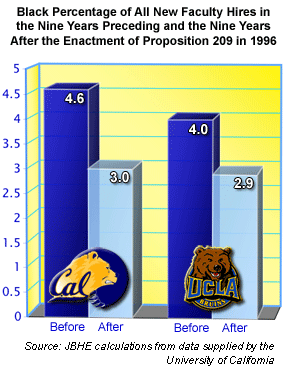

  |
“Too many Americans have nightmares instead of dreams. None of us are well off when many of us are not. There are many disparities in this country. They are unacceptable to me and should be to you.”
 — Bruce S. Gordon, president of the NAACP, speaking at the commencement of Gettysburg College, May 21, 2006. Gordon was the only African American in the 1968 graduating class at Gettysburg College. — Bruce S. Gordon, president of the NAACP, speaking at the commencement of Gettysburg College, May 21, 2006. Gordon was the only African American in the 1968 graduating class at Gettysburg College.
|
Ohio State Takes Effective Steps to Increase Black Enrollments
 The 2003 Supreme Court decision in the Gratz case ruled that the point-based admissions system at the University of Michigan was unconstitutional. The system assigned black applicants 20 points out of 100 needed for admission. The 2003 Supreme Court decision in the Gratz case ruled that the point-based admissions system at the University of Michigan was unconstitutional. The system assigned black applicants 20 points out of 100 needed for admission.
Ohio State University had a similar point-based system as the one used at the University of Michigan. As a result of the Gratz ruling, Ohio State changed its admissions procedures, and black enrollments dropped significantly.
After the drop in black enrollments occurred, the admissions office made a concerted effort to recruit black students. Radio advertisements were run on black-oriented music stations in urban areas. Admissions officials increased their visits to predominantly black high schools. And an extensive mailing campaign was conducted to prospective black students.
 Another facet of the effort was the publication of a diversity report by the Office of Minority Affairs. The colorful, professionally designed brochure offers prospective students information about multicultural groups on campus, curricula and research dealing with minority-related topics, diversity-related resources on the OSU campus, and facts about minority group members at the university. Another facet of the effort was the publication of a diversity report by the Office of Minority Affairs. The colorful, professionally designed brochure offers prospective students information about multicultural groups on campus, curricula and research dealing with minority-related topics, diversity-related resources on the OSU campus, and facts about minority group members at the university.
Black first-year enrollments were up 5 percent this year. African Americans are now 7.7 percent of the student body at Ohio State.

Test Coaching and Admissions Counseling Services Put Black Students at an Extreme Disadvantage When Applying to Law School
As we have reported in recent issues of the JBHE Weekly Bulletin, results on the Law School Admission Test have become increasingly important in admissions decisions at many of the nation’s law schools. This is so because the mean score on the test achieved by students admitted to a particular school impacts the law school’s rating in U.S. News & World Report’s rankings. This is of particular importance to blacks because the mean score achieved by black students who take the LSAT is below the mean score for entering students at all predominantly white law schools in the United States.
As is the case with the SAT for undergraduates, black students are often placed at a disadvantage in taking the LSAT because white students are more able to afford sophisticated test coaching classes. For example, the Kaplan Extreme LSAT test coaching class costs $1,449. Black students, who are far more likely than white students to come from low-income families, are less likely to have access to such training.
In addition to test coaching, the latest trend is the use of law school admissions counselors to help a student with his or her application and the writing of application essays. Admissions counseling to law and other professional schools has become big business. There are now 1,500 members of the National Association of Graduate Admissions Professionals. These admissions counselors charge up to $300 per hour, a rate out of reach for most black applicants to law school.

Black Students at UCLA Mount Protest March Over Lack of Racial Diversity on Campus
 Hundreds of black students, joined by representatives of other minority groups on campus, have held a protest march on the campus of the University of California at Los Angeles. The student protesters called for changes in the university’s admissions procedures in light of the fact that blacks make up only 2 percent of the freshman class that will matriculate this coming fall. Student leaders demand increased outreach programs to attract more black students to campus and a new admissions program for students to enter the university for the winter term. Hundreds of black students, joined by representatives of other minority groups on campus, have held a protest march on the campus of the University of California at Los Angeles. The student protesters called for changes in the university’s admissions procedures in light of the fact that blacks make up only 2 percent of the freshman class that will matriculate this coming fall. Student leaders demand increased outreach programs to attract more black students to campus and a new admissions program for students to enter the university for the winter term.
UCLA is prohibited by state law from considering race in its admissions decisions.

Medical University of South Carolina

Assistant Dean for Admissions for the College of Graduate Studies
Requirements: Ph.D. degree in the biological sciences, enthusiastic, outgoing and creative.
Primary roles: Help recruit graduate students, develop recruitment materials, travel, chair Admissions Committee, serve on some University committees.
Send C.V. and letters of reference to:
Jacqueline McGinty, PhD., Associate Dean
College of Graduate Studies
Medical University of South Carolina
173 Ashley Avenue
PO Box 250501
Room 102 BSB
Charleston, SC 29425
MUSC is an affirmative action, equal opportunity employer.
Racial Diversity a Hot Topic at Stanford University
JBHE’s latest research shows that blacks make up about 3.2 percent of the total full-time faculty at Stanford University. This places Stanford in the middle of the pack among the nation’s 30 highest-ranked universities in its percentage of black faculty.
 But a study by the Stanford Daily has found that blacks are nonexistent in many departments at the university, most notably in the natural sciences. The student newspaper found that no black scholar has ever had a faculty appointment in Stanford’s chemistry or mathematics department. Only one African American, the late Arthur Walker, has ever taught in the university’s physics department. But a study by the Stanford Daily has found that blacks are nonexistent in many departments at the university, most notably in the natural sciences. The student newspaper found that no black scholar has ever had a faculty appointment in Stanford’s chemistry or mathematics department. Only one African American, the late Arthur Walker, has ever taught in the university’s physics department.
On another front, Cullen Buie, the co-chair of the Stanford Graduate Student Council Diversity Committee, has charged that the university is not doing enough to increase racial diversity among graduate students. He presented evidence at a campus forum which showed that only 3 percent of all graduate students at the university are black. But he charged that the university refused to release data on the racial makeup of the graduate student population in various departments. “The university just will not yield this data, probably because it is so bad,” Cullen told the Stanford Daily.

Science Takes Center Stage at Shaw University
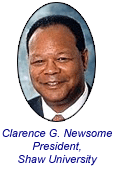 Shaw University in Raleigh, North Carolina, is looking to become a leader in scientific research among the nation’s black colleges and universities. Using a $4.3 million federal grant, Shaw is expanding its Roberts Science Building with a 30,000-square-foot addition that will include a new library, and classroom, laboratory, and office space. Shaw University in Raleigh, North Carolina, is looking to become a leader in scientific research among the nation’s black colleges and universities. Using a $4.3 million federal grant, Shaw is expanding its Roberts Science Building with a 30,000-square-foot addition that will include a new library, and classroom, laboratory, and office space.
Shaw plans to recruit 20 scientists to come to the university to conduct research on racial disparities in disease and health care at its Institute for Health, Social, and Community Research. The college has established an institutional review board to evaluate and approve research projects involving human subjects. It is one of the smallest universities in the nation with this capacity.

Duke University

Dean, The Fuqua School of Business
Duke University invites applications and nominations for the position of Dean of The Fuqua School of Business. The School is a major center for research and management education with a daytime MBA program, four Executive MBA programs (Cross-Continent, Frankfurt-Goethe, Global and Weekend), a Ph.D. program and open-enrollment Executive Education programs.
The Dean of The Fuqua School of Business is its chief academic and administrative officer and is responsible to the Provost and the President for leadership of the School. The Dean must have a commitment to further the educational and research goals of an elite professional school within a major research university. The Dean must be a visionary leader able to develop, articulate and execute strategies to accomplish the School’s goal of leadership in management education and research worldwide. He or she should be able to develop a relationship of mutual respect with all of the School’s partners, including faculty, students, staff, alumni, university leaders, corporate supporters and donors. The start date is July 1, 2007.
All applications will be held in strict confidence by the Search Committee. Applications and nominations should be sent to: Professor Christine Moorman, Chair, Dean Search Committee, The Fuqua School of Business, Duke University, 1 Towerview Road, Durham, North Carolina 27708, USA. Fax: 919-660-7951. Email: fuquadeansearch@duke.edu. The committee will begin reviewing nominations and applications after July 15, 2006.
Duke University is an equal opportunity/affirmative action employer.
Appointments
 • Victor LeBlue was named dean of the DeVry University campus in Colton, California, which is scheduled to open in July. LeBlue is a graduate of California State University at Dominguez Hills and holds a master’s degree in management from the University of the Redlands. • Victor LeBlue was named dean of the DeVry University campus in Colton, California, which is scheduled to open in July. LeBlue is a graduate of California State University at Dominguez Hills and holds a master’s degree in management from the University of the Redlands.
• Troy Mathieu was named director of athletics at Grambling State University in Louisiana. Mathieu has served as director of athletics for the Dallas Independent School District in Texas. He is a graduate of McNeese State University and holds a master’s degree from Western Illinois University.

Awards
 • Calvin D. Jamison, senior vice president and chief administrative officer at Hampton University, was presented with the Alumni Distinguished Service Award from Virginia Tech University. He holds a bachelor’s, master’s and a doctorate from Virginia Tech. • Calvin D. Jamison, senior vice president and chief administrative officer at Hampton University, was presented with the Alumni Distinguished Service Award from Virginia Tech University. He holds a bachelor’s, master’s and a doctorate from Virginia Tech.
• Justin Baba, a research scientist in the Engineering Science and Technology Division of the Oak Ridge National Library, will receive the 2006 Most Promising Scientist Award at the Minorities in Research Science Awards Conference this coming September in Baltimore. Baba, a native of Nigeria, is a graduate of LeTourneau University and holds a Ph.D. from Texas A&M University.

|
African Nations Sending the Most Students to Train at Colleges and Universities in the United States
In analyzing data supplied by the Institute of International Education, JBHE estimates that at least 25,000 black Africans are currently studying at colleges and universities in the United States. All told, 49 black African nations had college students studying in the U.S. during the 2004-05 academic year.
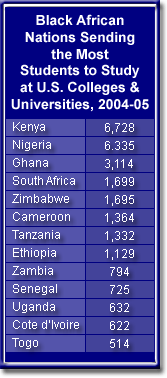 Among the black African nations, Kenya in 2004-05 sent the most students to American colleges and universities. In that period, 6,728 Kenyans were studying here. Among the black African nations, Kenya in 2004-05 sent the most students to American colleges and universities. In that period, 6,728 Kenyans were studying here.
Nigeria ranked second, sending 6,335 students to the United States. Nigerian enrollments are up by more than one third over the past three years.
Ghana, Zimbabwe, South Africa, Tanzania, Cameroon, and Ethiopia each had more than 1,000 students studying in this nation. Zambia, Senegal, Uganda, Cote d’Ivoire, and Togo all sent at least 500 students to study at U.S. colleges and universities.

Black Women Are Being Shortchanged on Athletic Scholarships
 Under Title IX of the Higher Education Act it is unlawful for colleges and universities to discriminate on the basis of sex in the funding of their athletic programs. Yet women make up 53.5 percent of all enrollments at the nation’s largest universities but are only 44.6 percent of all students who receive athletic scholarships. Under Title IX of the Higher Education Act it is unlawful for colleges and universities to discriminate on the basis of sex in the funding of their athletic programs. Yet women make up 53.5 percent of all enrollments at the nation’s largest universities but are only 44.6 percent of all students who receive athletic scholarships.
This gender inequity in opportunities for athletic scholarships is even more pronounced for African Americans. Black women make up 61 percent of all African-American enrollments at these large universities. But they are only 27.9 percent of all African-American students on athletic scholarships at these schools.

States That Enroll the Fewest Black Students in Higher Education
According to new data released by the Department of Education, Montana has the fewest African-American students enrolled in higher education of any of the 50 states. In 2004 there were only 287 black students enrolled in college in Montana. Wyoming had the second-fewest total of blacks enrolled in college with 329. The states of Idaho, South Dakota, Vermont, and North Dakota each had fewer than 1,000 black students enrolled in college.
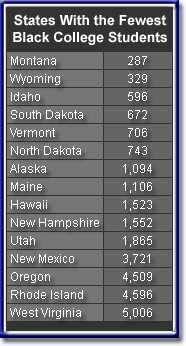 On a percentage basis, Montana also has the lowest level of black student enrollments. Only 0.6 percent of the more than 47,000 college students in Montana were black. Idaho was the only other state where blacks made up less than 1 percent of all college students. In Utah, Wyoming, South Dakota, North Dakota, Maine, and Vermont, blacks were less than 2 percent of all students enrolled in college. On a percentage basis, Montana also has the lowest level of black student enrollments. Only 0.6 percent of the more than 47,000 college students in Montana were black. Idaho was the only other state where blacks made up less than 1 percent of all college students. In Utah, Wyoming, South Dakota, North Dakota, Maine, and Vermont, blacks were less than 2 percent of all students enrolled in college.

Enrollments at Black Colleges on the Rise
According to the Department of Education, enrollments at the nation’s historically black colleges and universities continue to climb. In 2003, the latest year for which complete data is available, there were 306,727 students enrolled at 99 black colleges and universities in the United States. This is up from total enrollments of 257,152 students in 1990, an increase of 19 percent. This comes on the heels of a 10 percent enrollment increase during the 1980s.
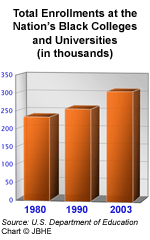 In 2003 African Americans made up 82.6 percent of the total enrollments at the nation’s black colleges. In 1980 blacks were 81.8 percent of all enrollments at these institutions. In 1990 blacks made up 81.2 percent of all enrollments at the black colleges. It is important to note that included among these colleges are institutions such as West Virginia State University and Bluefield State College which were founded as black colleges but now are predominantly white. In 2003 African Americans made up 82.6 percent of the total enrollments at the nation’s black colleges. In 1980 blacks were 81.8 percent of all enrollments at these institutions. In 1990 blacks made up 81.2 percent of all enrollments at the black colleges. It is important to note that included among these colleges are institutions such as West Virginia State University and Bluefield State College which were founded as black colleges but now are predominantly white.
So, contrary to generally accepted beliefs, the black colleges are not becoming whiter. In fact, the black colleges have slightly higher percentages of black students than they did 10 or 20 years ago.

  |
1,106,800 Total number of blacks enrolled in higher education in 1980.
2,164,700 Total number of blacks enrolled in higher education in 2004.
source: U.S. Department of Education
|
The Higher Education of the Army’s Newest Four-Star General
 William E. “Kip” Ward was promoted recently to deputy commander of the U.S. European Command. With this promotion, Ward will receive his fourth star, obtaining the Army’s highest rank of general. William E. “Kip” Ward was promoted recently to deputy commander of the U.S. European Command. With this promotion, Ward will receive his fourth star, obtaining the Army’s highest rank of general.
Ward holds a bachelor’s degree in political science from Morgan State University and a master’s degree in political science from Pennsylvania State University. He joined the Army in 1971. He has served in a wide variety of posts including assignments in Somalia and Bosnia.

African-American College Freshmen at High Risk for Chlamydia
A study by researchers at Emory University has found that college freshmen are 70 percent more likely to have the sexually transmitted disease chlamydia than older college students. More than 80 percent of the students in the study conducted on 10 college campuses in the South were African Americans. The study found that nearly one out of every seven college freshmen had contracted the disease.
Chlamydia is asymptomatic in 80 percent of women but can lead to serious consequences such as infertility and ectopic pregnancies. Therefore, the authors of the study recommended on-campus education and chlamydia screening programs for college freshmen.

Black College Graduate Making a Bundle Off of Crack Cocaine Documentary
 Daryl Smith is a 30-year-old graduate of North Carolina Central University, the historically black educational institution in Durham. He has produced a controversial new documentary film entitled Crackheads Gone Wild. The film, available on DVD, shows a series of street interviews of people addicted to crack cocaine. Most of the subjects are African Americans. One scene shows a couple having sex in a public park while taking hits off a crack pipe. Daryl Smith is a 30-year-old graduate of North Carolina Central University, the historically black educational institution in Durham. He has produced a controversial new documentary film entitled Crackheads Gone Wild. The film, available on DVD, shows a series of street interviews of people addicted to crack cocaine. Most of the subjects are African Americans. One scene shows a couple having sex in a public park while taking hits off a crack pipe.
Smith, who has a marketing degree, claims that the film is not exploiting the people he portrays, despite the fact that none of them were paid for their appearances. He says that the film is meant as an educational device to warn people of the dangers of crack cocaine addiction.
The 55-minute film has sold more than 60,000 copies at $15 each. A new version with additional profiles of drug users is scheduled for release later this month.

Barber-Scotia College Names New President
 This past semester there were no students enrolled at Barber-Scotia College, the historically black educational institution in Concord, North Carolina. The school lost its accreditation in 2004. Therefore, students at the school are not eligible for any type of federal financial aid. This past semester there were no students enrolled at Barber-Scotia College, the historically black educational institution in Concord, North Carolina. The school lost its accreditation in 2004. Therefore, students at the school are not eligible for any type of federal financial aid.
This fall Barber-Scotia College hopes to have a rebirth by holding adult education classes in conjunction with St. Augustine’s College, an accredited black college located in Raleigh. About 50 students are expected to enroll at the Barber-Scotia campus. Business administration will be the only field of concentration at the college.
Carl Flamer was recently named president of Barber-Scotia College to oversee the school’s transition. He was director of the college’s alumni association, a member of the board of trustees, and was a principal and teacher in the public school system in Charlotte. Flamer is a graduate of Barber-Scotia College and holds a master’s degree in educational administration from the University of North Carolina at Charlotte.

In Memoriam
Edgar F. Beckham (1933-2006)
 Edgar F. Beckham, the first African American to serve as dean of the college at Wesleyan University, died late last month after suffering a stroke. He was 72 years old. Edgar F. Beckham, the first African American to serve as dean of the college at Wesleyan University, died late last month after suffering a stroke. He was 72 years old.
A native of Hartford, Connecticut, in 1951 Beckham enrolled in the undergraduate program at Wesleyan University. He took a pre-med curriculum and edited the student newspaper. After his junior year, Beckham served for three years in the U.S. Army training as a neuropsychiatric technician. He returned to Wesleyan to earn his bachelor’s degree in 1958. He went on to earn a master’s degree and a Ph.D. in Germanic studies at Yale.
Beckham joined the Wesleyan University faculty in 1961 as an instructor in German. He served in various faculty and administrative posts for the next three decades. He was dean of the college from 1973 to 1990. Dean Beckham was also instrumental in establishing an African-American studies program at the university.
Lillian Martin Yeager (1944-2006)
Lillian Martin Yeager, dean of nursing at Indiana University Southeast in New Albany, Indiana, died late last month from ovarian cancer. She was 62 years old.
A graduate of Tuskegee University, Dean Yeager earned a master’s degree from Wayne State University and held a doctorate in educational leadership from Spalding University. She joined the faculty of Indiana University Southeast in 1973 as an assistant professor of nursing and remained on the faculty for the remainder of her life. She was named dean in 2002.
Lucius R. Weathersby (1968-2006)
 Lucius R. Weathersby, one of the nation’s leading experts on composers of African descent and an assistant professor of music and African studies at Dillard University, has died from a stroke at a hospital in Springfield, Massachusetts. He was 37 years old. At the time of his death Weathersby had left the hurricane-ravaged campus of Dillard to serve as a visiting professor at Amherst College. Lucius R. Weathersby, one of the nation’s leading experts on composers of African descent and an assistant professor of music and African studies at Dillard University, has died from a stroke at a hospital in Springfield, Massachusetts. He was 37 years old. At the time of his death Weathersby had left the hurricane-ravaged campus of Dillard to serve as a visiting professor at Amherst College.
A native of Houston, Texas, Weathersby earned a bachelor’s degree at Dillard University with a double major in music and German. He went on to earn a master’s degree from the University of Northern Iowa and a doctorate from the Union Institute in Cincinnati. He joined the Dillard faculty in 1997.
A concert organist, Weathersby released a series of CDs featuring the works of African and African-American composers. He was the founder of the International Consortium for the Music of Africa and Its Diaspora.
Paul B. McGirt Jr. (1927-2006)
Paul B. McGirt Jr., the longtime professor of French and director of the study-abroad program at Clark Atlanta University, died recently from complications of a fall. He was 79 years old.
A native of Camden, South Carolina, McGirt received a master’s degree in French from North Carolina Central University and studied for his doctorate at Case Western Reserve University in Cleveland.
Professor McGirt joined the Clark Atlanta faculty in 1957 and retired 35 years later in 1992. He had the reputation as a gifted but tough professor. Once he taught a class in which his younger brother was enrolled. He gave his brother a grade of F.

|



